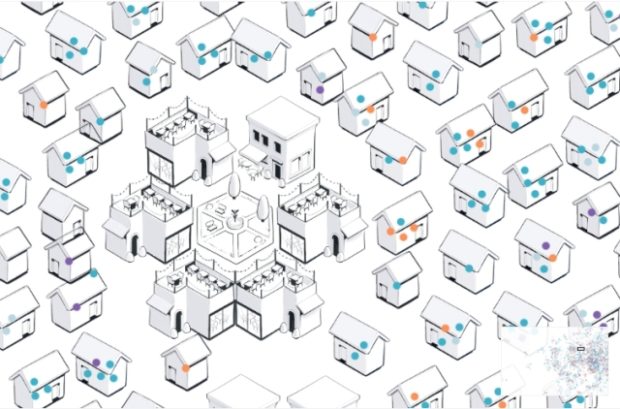‘People of the Pandemic’ game shows how we’re stopping viral spread

“People of the Pandemic” pulls population density and hospital capacity from United States zip code data. Image: Courtesy of peopleofthepandemicgame.com via AFP Relaxnews
How does staying inside help stop a viral pandemic? Why do we say that going out leads to more confirmed cases and deaths? What happens if everyone goes back to work after eight weeks of self-isolation?
A new web game from data visualization experts shows how simple decisions about when and why to leave our homes can have outsized impacts on the health of those around us.
In “People of the Pandemic”, players balance their basic needs for food and exercise with the health of society at large.
Over the course of an eight-week period, each player decides how often they will go out in the next seven days: once to take a walk, twice to buy groceries, three times to add on a run or more for social activities.
Their decisions are matched up against 19 others who have played before them.
Collectively, all 20 determine how many lives are lost or saved.
Want to play it safe? Then you’ve got to keep food stocks and exercise levels adequately high without giving the virus a big social network to spread through.
Wondering what happens when people carry on as usual? “People of the Pandemic” lets us see how that plays out too.
Then, at the end, there’s a chance to see what happens when everyone goes straight back to business after eight weeks of confinement — and how things could develop with a more cautious approach.
Spoiler: even after two months of containment, there’s a massive uptick in infection and mortality if everybody just goes back to normal.
In other words, the simulation says, if you’ve got the option to safely stay at home for longer, please take it.
The game was developed by design and data visualization expert Shirley Wu and spatial data specialist Stephen Osserman, working with a small team of developers, writers and consultants.
“It’s an extremely simplified model meant to illustrate the general principles of social distancing,” Osserman explains on collaborative data science service ObservableHQ. “Each day, as people who are infectious either stay home or travel to different destinations they ‘expose’ those they come across — in their homes or at the destinations they visit.”
Though the simulation is designed for use with specific United States zip codes, players can instead select a randomized urban, suburban or rural zone.
Want to see how “People of the Pandemic” would work with different assumptions?
A separate, pared-down infection disease simulation, linked from Osserman’s explanation, lets players go deeper into the model’s rulebook, altering parameters relating to population, disease and public health behaviors. RGA
RELATED STORIES:
LOOK: Facebook map shows which COVID-19 symptoms people are experiencing in different regions
For more news about the novel coronavirus click here.
What you need to know about Coronavirus.
For more information on COVID-19, call the DOH Hotline: (02) 86517800 local 1149/1150.
The Inquirer Foundation supports our healthcare frontliners and is still accepting cash donations to be deposited at Banco de Oro (BDO) current account #007960018860 or donate through PayMaya using this link.